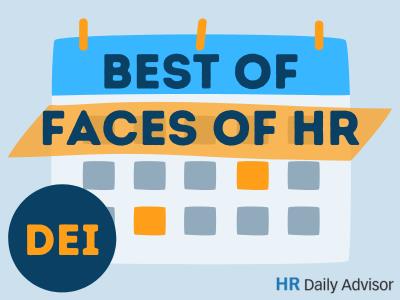It’s HR Diversity week here at HR Daily Advisor, and we couldn’t be more excited! Since Monday, we’ve run a gamut of free virtual events and resources to help organizations incorporate successful diversity, equity, inclusion, and belonging (DEIB) initiatives in their workplaces. For this week’s Faces column, we’re diving deeper, spotlighting a few diversity HR leaders we’ve recently profiled.
When it comes to creating and cultivating company culture, DEIB is critical, as it fosters not only belonging but also creativity, understanding, and fresh perspectives. Furthermore, diverse and inclusive workplaces can also provide a sense of safety and comfort. So, what does it take to make employees feel safe and comfortable?
For Dr. Shirley Knowles, Chief Inclusion and Diversity Officer at Progress, a provider of products to develop, deploy, and manage high-impact applications, her “north star” is helping talent feel like they’re valued and matter.
“The concept of ‘you matter’ can span across every background, group, and walk of life,” Knowles shared with HR Daily Advisor. “If your leader and your company make you feel seen and heard, you’re likely to work harder and give more effort to the work you’re doing. What’s better than a leader wanting the best for you and ensuring you feel safe and comfortable in your role? If a company can accomplish that goal – making people feel like they’re making a difference – I believe they’d see less attrition and more engagement from their employees.”
Andrea Ferrara, CHRO at PepsiCo Beverages NA, couldn’t agree more. “Ensuring our people feel safe and comfortable is absolutely one of my biggest priorities, and that starts with ensuring we have a strong cultural foundation,” she says. “We ensure all our tools, processes and practices ladder against those cultural pillars to drive the right behaviors and outcomes. We especially saw how effective this was for leadership during the pandemic, when our employees needed that reassurance from us that their safety and comfort remained at the forefront of our decisions. We built some creative and multi-faceted ways to reach our office-based and frontline employees to firstly thank them for all they were doing for us, and to emphasize we were taking every precaution necessary to keep them safe. I saw how far that went during those especially trying times and believe it has led to a stronger base of trust amongst our leadership and employees that has only grown these past years.”
Ayishah Williams, Director of People + Culture at Sounding Board, the first unified leader development platform designed to bridge the leadership gap, says helping talent feel safe and comfortable is important because “you hire whole.”
“There’s a movement toward understanding that people are whole human beings and not segmented, especially in a remote work environment,” Williams shared. “Now that we’re living at work, working from home, however you wish to phrase it, there’s no separation between the two. People show up as they are. The movement towards holistic HR is driven by the understanding that you’re going to get a whole human being when they show up at work, and that should be expected. Having a whole human being means that some days, they’re not going to be able to separate their work life from their home life, that there’ll be children in the background or pets.
“It’s all part of who that person is, all of their experiences, what goes on in their life, the things that they deal with on a day-to-day basis all factors into how they show up at work,” she continued. “Being able to address that holistically means looking at your employee population and knowing that you have these full human beings who have specific needs, and then providing services outside of the traditional medical, dental, and vision. It’s looking at the employee population and saying, ‘Okay, we now have this particular need, we should address this.’”
Dean Carter, CPO at Guild Education, takes this one step further, noting that purpose-centric cultures and leaders can accomplish good on an unimaginable scale. “That work must be centered on creating community rooted in positive cultures that foster psychological safety and trust,” Carter shared. “It also means really walking the walk on what people need. How are we thinking about effective teamwork and community-building as fully distributed or hybrid companies? How are we enabling working parents—not just giving them a leave of absence but creating systems where they are set up to succeed and their nuanced needs are taken into consideration. As a B-Corp founded with purpose at its center, Guild demonstrates we can do well by doing good for our members and our employees.”
At the end of the day, it’s important that employees have a vested interest in DEI, according to Knowles. “The work is not just for ‘underrepresented’ groups. There’s something for everyone. Diversity is not just race, ethnicity, and gender. There is diversity of thought. There is neurodiversity. There is diversity in abilities, skillset, and educational background. Talking about inclusion and diversity is not something to be afraid of. It’s something you can talk about with your peers if you are comfortable doing so. If you see something going on in the world and you are unsure of how to address it, there is someone you can reach out to—whether it’d be me, which I welcome, or if it’s someone you trust enough to say, ‘I don’t know what I don’t know, but I want to start learning.’ That’s where the journey begins, and the real work is done.”


